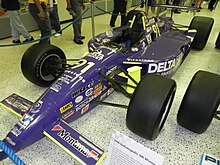 | |||||
| Indianapolis Motor Speedway | |||||
|---|---|---|---|---|---|
| Indianapolis 500 | |||||
| Sanctioning body | USAC/IRL | ||||
| Season | 1996 IRL season | ||||
| Date | May 26, 1996 | ||||
| Winner | |||||
| Winning team | Hemelgarn Racing | ||||
| Average speed | 147.956 mph | ||||
| Pole position | |||||
| Pole speed | 233.718 mph | ||||
| Fastest qualifier | |||||
| Rookie of the Year | |||||
| Most laps led | |||||
| Pre-race ceremonies | |||||
| National anthem | Florence Henderson | ||||
| "Back Home Again in Indiana" | Jim Nabors | ||||
| Starting command | Mary F. Hulman | ||||
| Pace car | Dodge Viper GTS | ||||
| Pace car driver | Bob Lutz | ||||
| Starter | Duane Sweeney | ||||
| Honorary starter | Robert James Eaton | ||||
| Estimated attendance | 300,000 | ||||
| TV in the United States | |||||
| Network | ABC | ||||
| Announcers | Paul Page, Danny Sullivan, and Bobby Unser | ||||
| Nielsen ratings | 7.1 / 23 | ||||
| Chronology | |||||
| |||||
The 80th Indianapolis 500 was held at the Indianapolis Motor Speedway in Speedway, Indiana on Sunday, May 26, 1996. This was the first Indy 500 contested as part of the new Indy Racing League, under the overall sanctioning umbrella of USAC. It was the third and final race of the 1996 IRL season. Veteran driver and former AIS champion Buddy Lazier won the race, his first career win in top-level Indy car competition, just over two months after he suffered a broken back in a crash at Phoenix. Lazier's victory marks the last (as of 2024) Indy victory for Ford, the second of two all-time victories for Reynard, and the first victory for Firestone since 1971.
The race was surrounded by months of controversy, and was a key component of "the Split", the name given in racing circles to the twelve-year organizational dispute in American open-wheel racing between the upstart Indy Racing League (IRL) and the established Championship Auto Racing Teams (CART). Most of the top teams and drivers in Indy car racing remained with CART, and protested over a perceived lockout because 1996 model-year chassis and engines not being approved and more prominently, the introduction of the 25/8 Rule, which guaranteed 25 spots in the 33-car starting field for the best performing IRL entries in previous races.[1] As a result, almost all of the CART teams chose to boycott the event, including Penske, Ganassi, Newman/Haas, Rahal, and many others. As a further protest, CART scheduled a competing race the same day, the U.S. 500 at Michigan International Speedway.
Participants in the 1996 Indy 500 included several familiar Indy car teams and owners such as A.J. Foyt, Dick Simon, Hemelgarn, and Menard, along with many new teams, some of which moved up from Indy Lights, AIS, or sports cars. More than half of the appointed drivers were rookies, and some had an obscure range of backgrounds, giving the impression of a field of replacement drivers.[1] There was only one former Indy 500 winner in the field (Arie Luyendyk), and three former pole position winners entered. In addition, there were no former national champions in the field for the first time since 1928.
During practice, the month activity was marred by the death of pole position winner Scott Brayton, who was killed on May 17, while testing a back-up car.[1] The month was also plagued by constant rain, as May 1996 was the fifth-wettest month of May at Indianapolis on record, and the fourth-wettest month of May in Indy 500 history.[2]
This was the final year of the turbocharged engine formula that had dominated the race for decades, which was not reintroduced until 2012. The track had been newly repaved, and all-time track record speeds were set during practice and time trials.[3] Arie Luyendyk set the official one-lap track record (237.498 mph), the four-lap track record (236.986 mph), and the fastest practice lap in Indy history (239.260 mph) just a fraction of a second shy of breaking the 240 mph barrier, while Eddie Cheever ran the fastest race lap (236.103 mph) in Indy 500 history - records that all still stand as of 2024.
The field was filled to the traditional 33 cars, but only one car was bumped (then-unknown Billy Boat). A total of 17 rookies qualified for the race, a post-WWII record, led by reigning USAC Silver Crown, Sprint and Midget champion Tony Stewart, who would become a future IRL and NASCAR champion. Stewart qualified for the front row, started on pole position due to Brayton's death, and took home rookie of the year honors. While comprising half the field, only two rookies managed to finish in the top ten.
Media attention of the open wheel "split" was highly critical going into the race, as a number of the IRL participants were ridiculed and the prestige of the Indianapolis 500 itself was brought into question.[1][4] The "split" embittered a significant portion of the fanbase, and journalist Robin Miller of The Indianapolis Star was among the most outspoken of critics. However, the race itself was found to be competitive and entertaining,[1][4] while the rival U.S. 500 suffered a multi-car pile-up prior to the green flag.[1][4]
- ^ a b c d e f Hungess, Carl (1996). The 1996 Indianapolis 500 Yearbook. Carl Hungness Publishing. ISBN 0-915088-78-9.
- ^ "Monthly Temperature and Precipitation Extremes for Indianapolis (1871 to 2008)". NOAA.gov. 2008-06-01. Retrieved 2009-10-28.
- ^ "108 years of Indy 500 history revealed in IMS track sample".
- ^ a b c Cite error: The named reference
Autoweekwas invoked but never defined (see the help page).